QuestionI have a 14 week old male, maltipoo that I adopted at 9 weeks. I had him neutered at 12 weeks as recommended by the breeder and I took him to a special pediatric vet to have this done and all went well with the surgery and in just a few hours he was running around like nothing happened. My problem is housetraining. I am a very "A" type personality and did a lot of reading on the importance of consistency, schedule, etc. For the last four weeks, I have faithfully followed the crate training method with no free food or water sitting out, only food scheduled 3 times per day and water as needed but monitored so I know when to expect a potty break. I take him on short walks twice per day and orginally I got up every 2 hours to take him out of his crate at night for a potty break as he sleeps in his crate by my bed. He is now able to hold it for 6 hours at night since I do not give him any water 3 hours before bed and give him many times to eliminate before turning in for the night. My problem is that while he understands not going in the crate, that has not translated to not going in the house. Even if he has recently eliminated, he will not hold it or signal that he has to go. He is only in the room where I am when he is not in the crate so I can keep a close eye on him. It is hard to know what he is about to do because he is only 3 pounds. Last night for example he had water at 7pm and then went out at 7:30 to potty and again at 8pm. I then gave him free time in our family room with me to play with is toys. At 8:15 he went potty on the rug right in front of me. I caught him in the act and scooped him up and took him to the elimination spot outside which is the same place he always goes through the same door which he can see from my family room. I know how intelligent he is because when he wants water he goes to his bowl and pushes it around with his nose to indicate for me to put water in it. The distance he has to walk to get to his bowl is the same distance by the door we go out to eliminate. When he is hungry he sits by the cabinet where I keep his food, again same distance as he door. Because of the dedication of the crate training, he knows exactly what to do when we get to the elimination area and does his business right away. I always provide praise and reward for him doing this. I don't know if it is the difficulty of a toy breed or because I have "over trained" him by being so strict with his schedule and taking him out every 30 minutes to an hour depending on when he had water. Also because I am home with him all day perhaps he has come to depend on me to anticipate and initiate all his potty needs. I use to carry him to the door to eliminate but stopped about 2 weeks ago so that he would be in the habit of walking there on his own. How does he know so well how to signal me for what he wants/needs but will think nothing of going potty on the floor? What do you suggest?
AnswerMuch of what you are doing is just what I tell people. Perhaps you need to work with his schedule, and less yours. You also need to recognize when he needs to go out, and take him out then. It is a little harder now, because they can go longer. He needs to learn to go to the door. You may need to walk him around when you have him out to stimulate elimination and leave him out a little longer to see if he does any more. I am going to ask you to read through my advice on housebreaking. Much of it you are already doing, but it has details on knowing when to take him out, and teaching him to go to the door that should help.
Thank you for being a responsible pet owner and neutering him.
Much of housebreaking is not training the puppy, but making it easier for your puppy, you, and your carpet while its body to catches up to its instincts. At around 8 weeks when the puppy goes to its new home, the time from when it realizes it has to go, and when it can't wait any longer is a matter of seconds. Only time will fix that. You can hardly be expected to be attentive enough to avoid all accidents. There is no sense punishing the puppy for your inattention. It is not fair to punish you either, but you still have to clean it up if you didn't have the puppy outside in time.
Housebreaking starts before you get home with the new puppy. If you don't have a crate, buy one. I prefer the more enclosed, den like plastic ones. Skip the bedding. At first it gets wet, and later it can be chewed into choking hazards. A wire grid in the bottom will help keep the puppy up out of accidents at first. They are available with the crates, but expensive and hard to find. A piece of closely spaced wire closet shelving from a home supply place is cheaper. I am now using a plastic vegetable bin with plenty of holes drilled in the bottom. It helps block off part of the crate for the smaller puppy. If you already have a metal crate, covering it may help. Just make sure you use something the puppy can't pull in and chew. Dogs that start out in crates as little puppies, accept them very well. Never leave an unattended puppy loose in the house. If nobody can watch it, put it in the crate. I suggest letting the dog have its crate all its life. A crate needs to be just big enough for a dog to stretch out in.
Choose a command and spot you want it to use. The less accessible to strays, the less chance of serious disease. If it is a female, choosing a non grassy spot will avoid brown spots later. When you bring it home, take it to the spot and give it the command in a firm, but friendly voice. Keep repeating the command and let the puppy sniff around. If it does anything, praise it. Really let it know what a good dog it is and how much you love it, and maybe a treat. Note, being out there not only means you can praise it, but it also keeps it from being snatched by a hawk. If it doesn't go, take it inside and give it a drink and any meals scheduled. A young puppy will need to go out immediately afterward. Go to the spot and follow the above routine. Praising it if it goes is extremely important. If it doesn't go, take it back inside and put it in its crate and try again soon. Do not let it loose in the house until it does go.
At first it is your responsibility to know and take the puppy out when it needs to go. It needs to go out the first thing in the morning, after eating, drinking, and sleeping. If it quits playing, and starts running around sniffing, it is looking for a place to go. Take it out quickly. You will just have to be what I call puppy broke until it is a little older. How successful you are depends on how attentive you are.
By the time most dogs are about 3 months old, they have figured out that if they go to the door and stand, you will let them out. The praise slowly shifts to going to the door. Some people hang a bell there for the dog to paw. If your dog doesn't figure this out, try praising it and putting it out if it even gets near the door. When you catch it in the act, give it a sharp ''Ah, ah, ah!'' and take it out. Clean up accidents promptly. I mostly keep the little puppies out of the carpeted rooms. Still I need the can of carpet foam sometimes. First blot up all the urine you can with a dry towel. Keep moving it and stepping on it until a fresh area stays dry. A couple big putty knives work well on bowel movements. Just slide one under it while holding it with the other. This gets it up with a minimum of pushing it down into the carpet. This works with even relatively soft ones, vomit, dirt from over turned house plants, or anything else from solids to thick liquids. Finish up with a good shot of carpet foam. Note, do not let the puppy lick up the carpet foam. Once the dog is reliably housebroken, your carpet may need a good steam cleaning.
Many people strongly strongly push cleaning up all evidence of past accidents. I am slower to suggest that. Dogs will return to the same spot if they can find it. When you see one sniffing the spot, that is your clue to run it out.

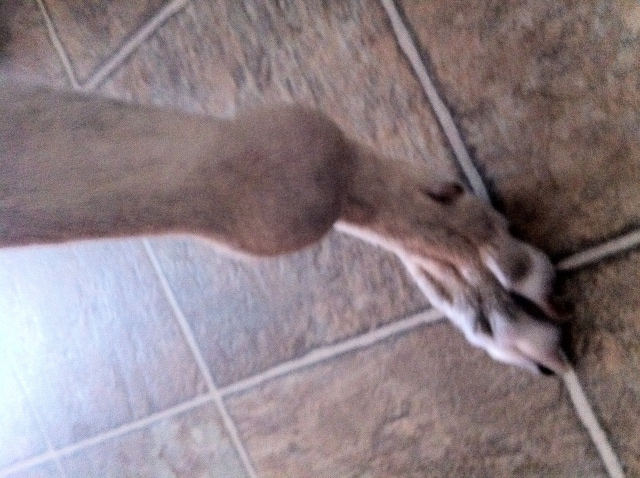 Growth on dogs right foreleg
Question
Foreleg 1 Foreleg 2
Hi Gary,
Our
Growth on dogs right foreleg
Question
Foreleg 1 Foreleg 2
Hi Gary,
Our
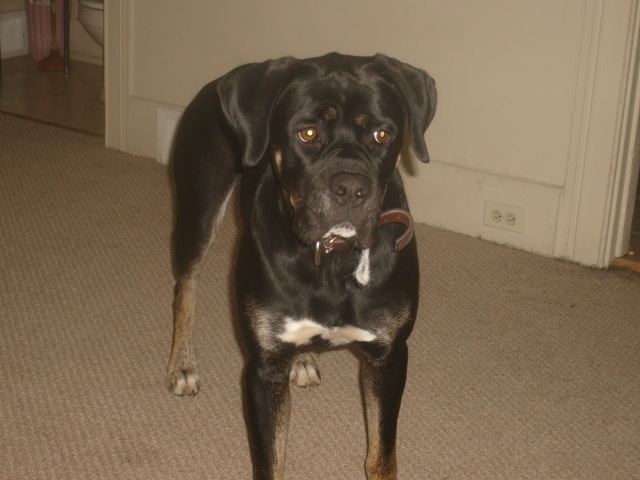 What is my dog
Question
This is the mystery do
a year ago a 11month ol
What is my dog
Question
This is the mystery do
a year ago a 11month ol
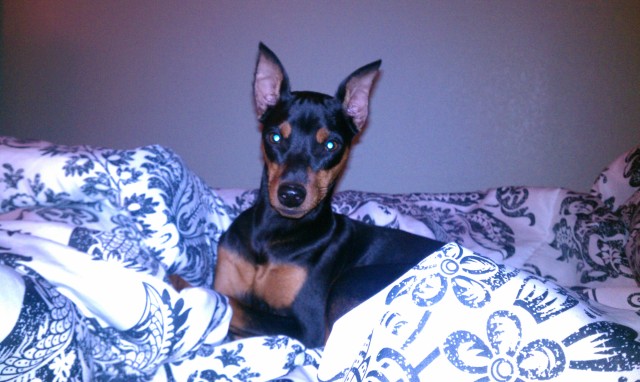 My miniature pinscher :)
Question
Chanel
I had a miniature pinscher of 8
My miniature pinscher :)
Question
Chanel
I had a miniature pinscher of 8
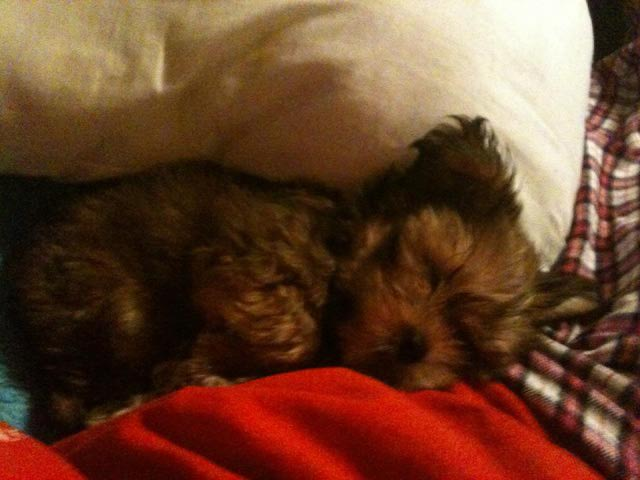 willpups hair grow back to original color
Question
here is his color befo here is after &nb
willpups hair grow back to original color
Question
here is his color befo here is after &nb
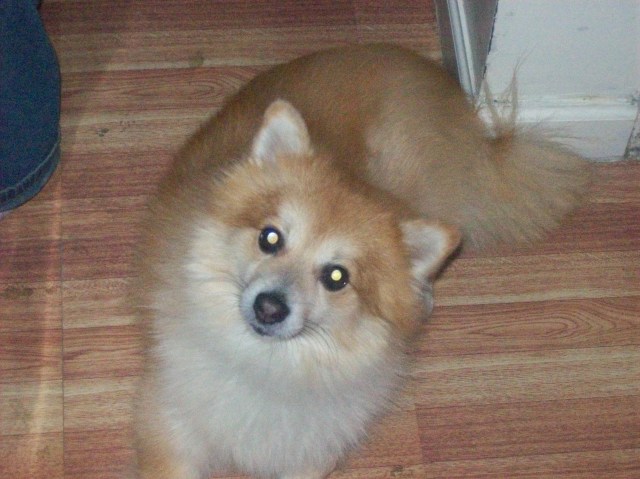 pomeranian
Question
the pomerainan
hey, i have a pom who is 3years
pomeranian
Question
the pomerainan
hey, i have a pom who is 3years